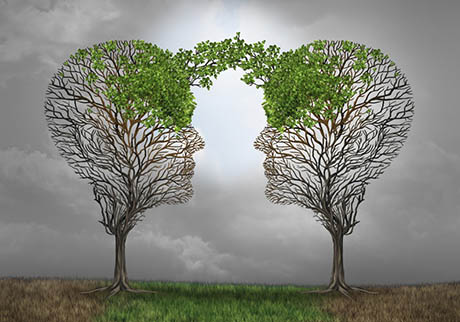The most lost people are those who don’t know they need to be rescued.
Needing others is discouraged in our culture. We get the message that we need to be tough — that we need to hide our wounds and fears and doubts. We’re told to put on a brave face. We’re told not to cry. We learn not to show our feelings. We learn to hide our vulnerability.
Mostly, we’re taught not to need anyone, because that’s a sign of weakness. In extreme versions, we even have labels such as “co-dependency.” It’s a psychological dysfunction. And that helps us justify our practice of numbing ourselves to our feelings in order to shut others out.
But what if we are designed to need each other? What if our nature means that every single one of us has deep needs and scars and vulnerabilities? What if we all need mutual rescue — a relationship where we can rescue each other?
I’m thinking about that today because of what a friend posted about his wife. She died today — and he’s grieving for the woman who rescued him.
Tom’s wife, Julie, has been sick lately and I knew it was serious. When Tom wrote today on Facebook about Julie, he started by talking about her love of animals — horses, goats, dogs, cats and mice. He said she always gave of herself to help those in need.
Then he talked about the two of them meeting more than 30 years where they both worked.
“Though I had recently suffered repeated personal emotional setbacks, Julie saw in me something that she liked, maybe even more than pet mice,” Tom wrote. “Julie ‘saved me’ from an emotional morass that was enveloping me then. Since that time we both saved the other several times, raised a wonderful son, and had many other accomplishments together.”
When they met, Tom was the one in emotional need — and he knows Julie saved him from something that was taking him down an unhealthy path. She rescued him in that hour of need, but the most important part is after that — when he says “we both saved the other several times.”
Many people don’t believe they’re worthy of being loved and cared for if they have needs and vulnerabilities. They think they have to be perfect before they can trust someone to love them. I don’t think they consciously understand why they fear they won’t be loved. I think they’re simply scared of their great need and their great vulnerability.
So they hide their weaknesses and fears, throwing themselves into work or striving for achievements that will allow themselves to become numb to their feelings. In that numbness, they can ignore their needs. They can ignore the core self inside crying for help.
It’s very rare for someone who’s headed down this lonely road to trust another person and enter into a relationship of mutual rescue. Tom was lucky because he found that in Julie. The relationship was healthy because each one needed rescue — and each gladly gave to take care of the other’s needs.
“Julie passed away this morning,” Tom wrote. “However, I have had the benefit of being with her for over 30+ years. She really healed me from many of the weaknesses that I had previously.”
Tom closes what he wrote by noting that the son he had with Julie gives him a reason to go on — and then he concludes that he will always love this woman who rescued him.
I need to be rescued. If you’re not in a relationship like this, you probably need to be rescued, too. But there’s another side. I want to rescue someone else, not as a way of having power over something but as a mutual expression of love and understanding and help.
Very few people today have the sort of relationship that Tom and Julie had. I don’t — and I need it. Maybe you do, too.
But you will never find that place of mutual rescue and mutual love until you admit to yourself — and to someone else — that you have the need. Breaking down the walls of your own heart and seeing your need is the first step. Trusting the right someone with that vulnerability — and pledging mutual support — is the next.
Living a human life is lonely and disappointing and cold. Only the mutual rescue — the love and understanding and active help — that come from the best relationships can make this life worth living.
I envy the relationship of mutual rescue which Tom and Julie had — and I mourn with Tom in his loss of this woman he still loves.

 A year later, my father’s death looms large, but I have no regrets
A year later, my father’s death looms large, but I have no regrets Do tales of ‘Black Friday violence’ reflect reality or just our bias?
Do tales of ‘Black Friday violence’ reflect reality or just our bias? How should we react when man admits molesting own daughter?
How should we react when man admits molesting own daughter?